福建省四地六校2015_2016学年高一英语上学期第二次联考(11月)试题
高中英语真题:学2015-2016学年高一上学期第二次月考试题.doc
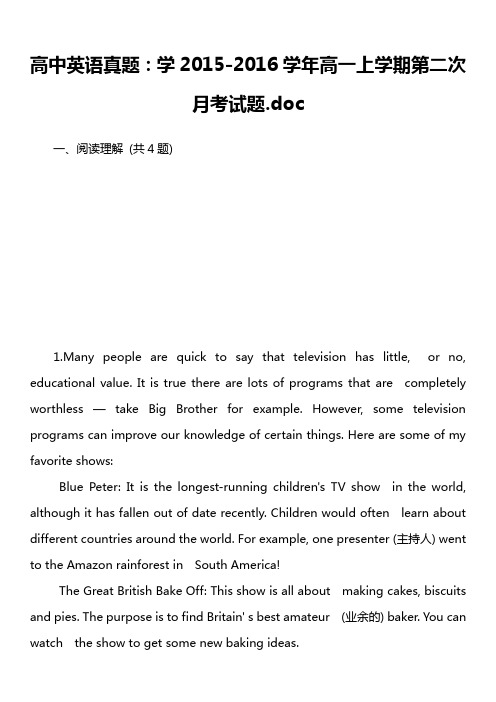
A. had a car accident B. died in a big pond
C. became a Superman D. gave away his kidneys
26. The underlined word "that" in Paragraph 4 refers to .
Before his death, Chris cared a lot about organ donation (器官捐献), Jackie says. In fact, one of their usual conversations was the fact that they were both ready to be donors. "It was very clear in the first few hours after Chris's accident that the damage (损伤) to his brain was deadly, so I talked to the doctors about that because it was something very important to Chris," Jackie says.
Frozen Planet: David Attenborough has produced many films about wildlife. This one is about life in the most northern and southern parts of the world: polar bears, seals, penguins, moose and many more animals. I love this show mainly because it teaches us about the influence we have on the planet and what we need to do to save these places.
2016届福建四校高三第二次联考英语试卷
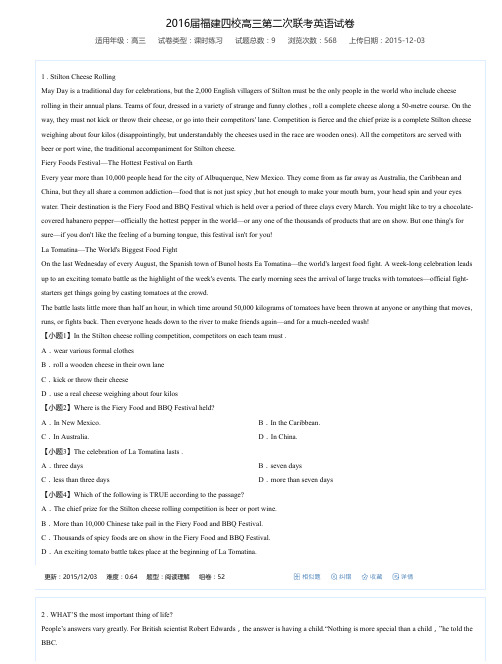
Nowadays,Reuters reports,some 4.3 million other“test-tube” children exist. Edwards received a Nobel Prize in 2010 and was knighted(封为爵
士)by Queen Elizabeth Ⅱ the following year.
up to an exciting tomato battle as the highlight of the week's events. The early morning sees the arrival of large trucks with tomatoes—official fight-
A.wear various formal clothes
B.roll a wooden cheese in their own lane
C.kick or throw their cheese
D.use a real cheese weighing about four kilos
【小题2】Where is the Fiery Food and BBQ Festival held?
D.more than seven days
【小题4】Which of the following is TRUE according to the passage?
A.The chief prize for the Stilton cheese rolling competition is beer or port wine.
“quite alone” at the time.
“But Edwards was a fighter,and he believed in what he was doing,”said Sauer. Without support from the government,the two struggled to raise
高中英语真题-2015-2016学年上学期高一英语第二次段考试题
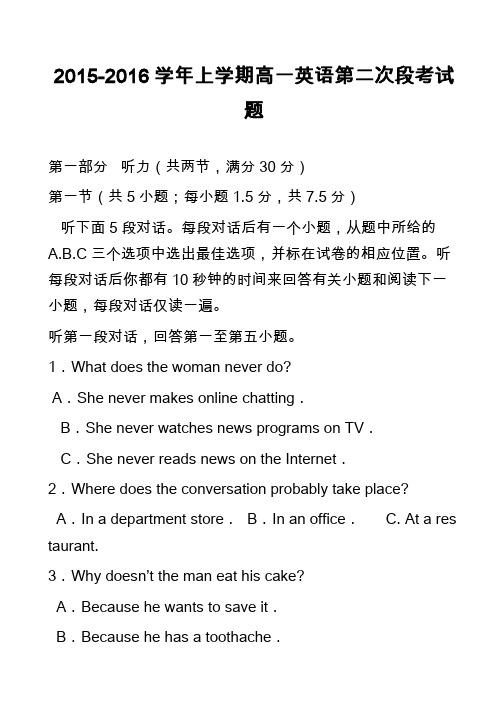
2015-2016学年上学期高一英语第二次段考试题第一部分听力(共两节,满分30分)第一节(共5小题;每小题1.5分,共7.5分)听下面5段对话。
每段对话后有一个小题,从题中所给的A.B.C三个选项中选出最佳选项,并标在试卷的相应位置。
听每段对话后你都有10秒钟的时间来回答有关小题和阅读下一小题,每段对话仅读一遍。
听第一段对话,回答第一至第五小题。
1.What does the woman never do?A.She never makes online chatting.B.She never watches news programs on TV.C.She never reads news on the Internet.2.Where does the conversation probably take place?A.In a department store. B.In an office. C. At a res taurant.3.Why doesn’t the man eat his cake?A.Because he wants to save it.B.Because he has a toothache.C.Because he doesn’t like the taste.4.What can we learn from the conversation?A.Ellen is not in the office.B.Becky is Ellen’s best friend.C.Bobby dialed the wrong number.5.How much did the shoes cost originally(最初)?A.60 dollars. B.90 dollars. C.120 dollars.第二节:(共15小题; 每题1.5分 ,共22.5分)听下面5段对话或独白。
福建省四地六校高一下学期第二次月考试卷(英语).doc
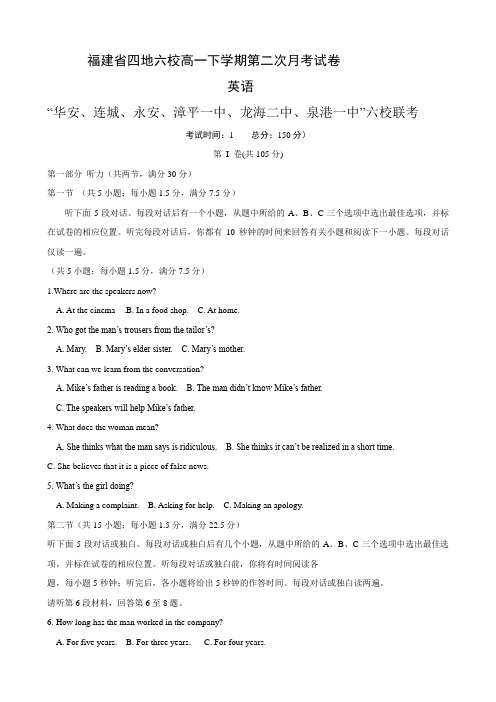
福建省四地六校高一下学期第二次月考试卷英语“华安、连城、永安、漳平一中、龙海二中、泉港一中”六校联考考试时间:1总分:150分)第I 卷(共105分)第一部分听力(共两节,满分30分)第一节(共5小题;每小题1.5分,满分7.5分)听下面5段对话。
每段对话后有一个小题,从题中所给的A、B、C三个选项中选出最佳选项,并标在试卷的相应位置。
听完每段对话后,你都有10秒钟的时间来回答有关小题和阅读下一小题。
每段对话仅读一遍。
(共5小题;每小题1.5分,满分7.5分)1.Where are the speakers now?A. At the cinema .B. In a food shop.C. At home.2. Who got the man’s trousers from the tailor’s?A. Mary.B. Mary’s elder sister.C. Mary’s mother.3. What can we learn from the conversation?A. Mike’s father is reading a book.B. The man didn’t know Mike’s father.C. The speakers will help Mike’s father.4. What does the woman mean?A. She thinks what the man says is ridiculous.B. She thinks it can’t be realized in a short time.C. She believes that it is a piece of false news.5. What’s the girl doing?A. Making a complaint.B. Asking for help.C. Making an apology.第二节(共15小题;每小题1.5分,满分22.5分)听下面5段对话或独白。
高中英语真题-2015-2016学年上学期第二次月考高一英语试题【新课标】
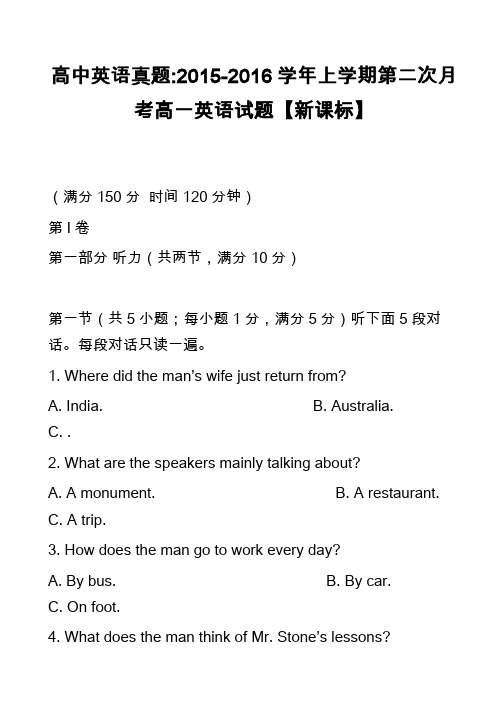
高中英语真题:2015-2016学年上学期第二次月考高一英语试题【新课标】(满分150分时间120分钟)第I卷第一部分听力(共两节,满分10分)第一节(共5小题;每小题1分,满分5分)听下面5段对话。
每段对话只读一遍。
1. Where did the man’s wife just return from?A. India.B. Australia.C. .2. What are the speakers mainly talking about?A. A monument.B. A restaurant.C. A trip.3. How does the man go to work every day?A. By bus.B. By car.C. On foot.4. What does the man think of Mr. Stone’s lessons?A. Boring.B. Helpful.C. Unnecessary.5. Where does the conversation probably take place?A. In a restaurant.B. In a market.C. In a hotel.第二节(共5个小题;每小题1分,满分5分)听下面2段对话。
每段对话读两遍。
听第6段材料,回答第6至8题。
6. Where is the man going?A. To .B. To Frankfurt.C. To .7. Where will the man meet Jane and Peter Cook?A. In someone’s house.B. In a restaurant.C. In his hotel.8. How will the man go to ?A. By train.B. By plane.C. By car.听第7段材料,回答第9至10题。
福建省四地六校联考高一第二次月考(英语).doc
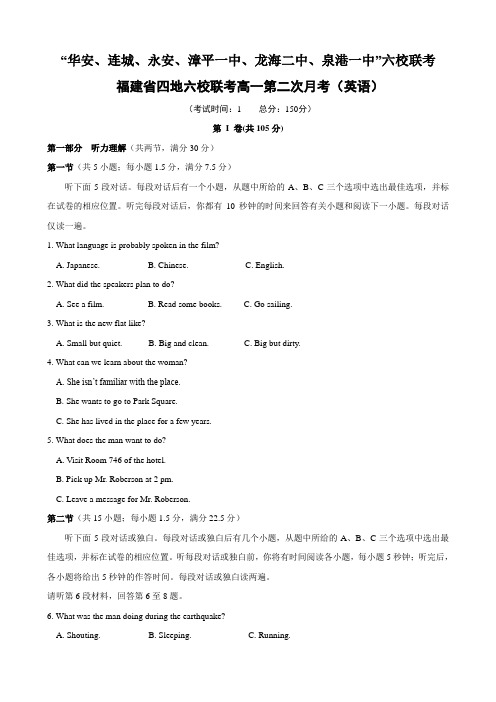
“华安、连城、永安、漳平一中、龙海二中、泉港一中”六校联考福建省四地六校联考高一第二次月考(英语)(考试时间:1总分:150分)第I 卷(共105分)第一部分听力理解(共两节,满分30分)第一节(共5小题;每小题1.5分,满分7.5分)听下面5段对话。
每段对话后有一个小题,从题中所给的A、B、C三个选项中选出最佳选项,并标在试卷的相应位置。
听完每段对话后,你都有10秒钟的时间来回答有关小题和阅读下一小题。
每段对话仅读一遍。
1. What language is probably spoken in the film?A. Japanese.B. Chinese.C. English.2. What did the speakers plan to do?A. See a film.B. Read some books.C. Go sailing.3. What is the new flat like?A. Small but quiet.B. Big and clean.C. Big but dirty.4. What can we learn about the woman?A. She isn’t familiar with the place.B. She wants to go to Park Square.C. She has lived in the place for a few years.5. What does the man want to do?A. Visit Room 746 of the hotel.B. Pick up Mr. Roberson at 2 pm.C. Leave a message for Mr. Roberson.第二节(共15小题;每小题1.5分,满分22.5分)听下面5段对话或独白。
每段对话或独白后有几个小题,从题中所给的A、B、C三个选项中选出最佳选项,并标在试卷的相应位置。
福建省四地六校2015届高三英语上学期第二次联考试题(含解析)

福建省四地六校2015届高三英语上学期第二次联考试题(含解析)(考试时间:120分钟总分:150分)第一部分听力 (共两节,满分30分)第一节听下面5段对话。
每段对话后有一个小题,从题中所给的A、B、C三个选项中选出最佳选项,并标在试卷的相应位置。
听完每段对话后,你都有10秒钟的时间来回答有关小题和阅读下一小题。
每段对话仅读一遍。
1. What will the woman probably do this afternoon?A. Go to the Olympic Games.B. Stay at home.C. Visit her friends.2. What happened to the boy today?A. He fought with someone at school.B. He didn’t go to school.C. He lied to his teacher.3. Where does the conversation probably take place?A. Inside a cinema.B. In a ticket office.C. Outside a cinema.4. What is true about the woman?A. She likes math now.B. She is very good at English.C. She thinks the man is funny.5. What happened to the woman?A. She wanted to take the 6:00 flight.B. She misunderstood the man.C. She changed the reservation to 7:00.听第6段材料,回答第6、7题。
6. How many times has the man made dumplings?A. Twice.B. Once.C. Never.7. What does it need to make good dumplings according to the woman?A. Practice.B. A secret recipe.C. Talent.听第7段材料,回答第8、9题。
2016-2017学年上学期福建省四地六校联考高三第二次月考试卷

2016-2017学年上学期福建四地六校联考第二次月考高三英语试卷第Ⅰ卷(满分100分)第一部分听力理解第一节(共5小题;每小题1.5分,满分7.5分)1. What do we learn from the conversation?A. There will be a math exam tomorrow.B. Today is the man’s birthday.C. The man doesn’t like math exams.2. What colour is the woman’s dress?A. Blue.B. White.C. Black.3. When did the man’s daughter set a new world record?A. In 1999.B. In 2005.C. In 2009.4. What does the man mean?A. He moved the desk alone.B. He had some classmates move the desk.C. His classmates helped him move the desk.5. What time is it now?A: 3:10. B: 3:15. C. 4:10.第二节(共15小题;每小题1.5分,满分22.5分)听第6段材料,回答第6、7题。
6. Who might the man be?A. A waiter.B. The woman’s friend.C. The woman’s husband.7. Where was the wallet found?A. In the restroom.B. At the cash desk.C. On the table.听第7段材料,回答第8、9题。
8. What are those children like?A. Shy.B. Active.C. Selfish.9. Why does the woman have to leave?A. Because her children are ill.B. Because her parents are in poor health.C. Because her friends made her leave.听第8段材料,回答第10至12题。
高中英语真题:2015—2016学年度第二学期高一英语中期考试卷

2015—2016学年度第二学期高一英语中期考试卷第I卷第一部分阅读理解(共40分)一.阅读理解根据短文内容选择最佳答案(每小题2分,共30分)AThere once was a very honest shopkeeper whose business w as to provide goods to the local people. He would open his sh op at 8:00 a.m. after having his breakfast and at 1:00 p.m. he would go for lunch. In the evening at 8:30 p.m. he closed his s hop to complete his daily routine.However, to get time for lunch was really difficult because he didn’t have anybody to help him at that time. Therefore, it was his daily practice that whichever customer was shopping at 1:00 p.m. would be asked to oversee (看管) the shop until the shopkeeper returned from lunch.One day, a group of four thieves planned to steal from his sho p while he was gone for lunch. One of the thieves went at 1:00 p.m. to be the customer that would be asked to oversee the shop.The thief, pretending to be a customer, went in at 1:00 p.m . and started buying several items. As planned, the shop-keeper asked the thief to sit on his chair for thirty minutes until he returned from lunch.Then, the other three thieves quickly came and told the pre tend customer to help, but something had changed within him and he knew deeply in his heart that if he was given responsibility for the shop, he should not perform any dishonest acts during that ti me. His friends did not agree. As the now honest man tried to stop them, they resisted (抵抗) and a fight started. And at the same time the shopkeeper r eturned and asked why there was a fighting. The now honest man explained the entire plan.The shopkeeper had been searching for an honest man w ho could take ownership of the shop and run it. The shop-keeper felt that he had found the right man.1. What is the problem for the shopkeeper?A. Nobody could prepare lunch for him every day.B. He had nobody to keep the shop when he went for lunch.C. He was too busy to have lunch every day.D. He couldn’t find a person to work at the shop.2. Why did the thief go to the shop at 1:00 p.m.?A. Because he thought he would be asked to keep the shop.B. Because the shopkeeper invited him to lunch then.C. Because the shop was closed at that time.D. Because he thought he could buy cheap things then.3. When the shopkeeper returned from lunch, he found _____ __.A. everything in his shop was stolenB. the thief became the new owner of the shopC. there was a fighting in his shopD. the thief helped his fellows steal things from his shop4. From the passage, we can infer that _______.A. once a thief, he will always be a thiefB. an honest man will be responsible for his actionC. you can’t believe in a dishonest man foreverD. trust can change a thief into an honest manBSunnyNowadays they are giving homework even during the holidays and I hate that very much. But I think there is a reason for it. Homework is given so that we can remember whatever we ha ve learnt. Regular drilling and repetition make perfect. But tea chers have started to give too much homework. Anything in e xcess (过度) is bad. So homework should be given with the idea of givi ng students a practice and not to overwork them.JaneWhat’s the use of just homework without allowing children to get an insight (洞察) into the subject? It just makes them bookworms but nothin g else. Homework such as writing some things 5 times at hom e will just make them memorize things but not put them into u se. I regret to say that teachers find it easy to bundle (归拢) the children with homework rather than making them get i nterested to understand what they learn. The same trend cont inues even in college. I find that most of the so-called high scorers are unable to answer simple things in an i nterview.SallyIt is OK to give homework. But it should be given less. We are spending most of our time in school and at least we must be f ree in our home. If you give homework, we will be very tired a nd we wouldn’t be able to pay attention to extra-curricular activities, which in turn may affect our physical and mental health. So please give less homework to us.JohnsonIt is part of our work to give students homework. There will be some punishments if we won’t do our work. So I have to do th at though I know such a teacher is not liked by students.5. Who thinks that too much homework may do harm to stude nts’ physical and mental health?A. Sunny.B. Jane.C. Sally.D. Johnson.6. According to the last paragraph, why do teachers give stud ents homework?A. Because they care more about student s’ metal health.B. Because they find it easy to control students in this way.C. Because they will be punished if they don’t give homework.D. Because they want students to get interested in their studie s.7. What problem do the speakers talk about?A. Whether students should be punished without doing home work.B. What kind of homework should be given to students.C. What role homework plays in helping students to learn.D. Whether teachers should give homework to students.CA car needs gas to run and your body also needs food to wor k for you. Eating the right kind of food is very important. It can help your body grow strong to take care of what you eat.There are four main food groups altogether. The dairy group has food like milk, cheese and sour milk. The other three gro ups are the meat and fish group, the fruit and vegetable group , and the bread and rice group. Each meal should have at lea st one food from all four main groups. With all these food toge ther, you will be given enough energy during the day.It is easy to get into bad eating habits. You may eat your bre akfast in a hurry to get to school on time. Or you may not hav e time for a good lunch. It may seem easy to finish your supp er with fish and chips all the time. But you will find yourself tire d in these days and you can not think quickly.Watching what you eat will help keep your body healthy andstrong. It is also good to take some exercise. It will help you e at more if you take a walk or play games in the open air. Havi ng a good eating habit with some exercise is the key to your h ealth.8. Which of the following is a good eating-habit?A. Going to school without any breakfastB. Eating fish and chips for supper all the time..C. Having at least one food from all four groups each meal.D. Having different food from all four food groups.9. In this passage the writer mainly tells us that _____.A. every person needs food to grow wellB.taking exercise can keep your body strongC. the right kind of food with exercise will keep you healthyD. enough energy helps people think more quickly10. The underlined word “dairy” in the second passage means _____.A. the food made out of cows such as milk and butterB. the shop that sells milk and buttera farm where cows are keptD. a place where milk products are made.DIs there anything more important than health? I don’t think so. “Health is the greatest wealth(财富),” wise people say. You can’t be good at your studies or wo rk well when you are ill.If you have a headache, toothache, backache, earache or bad pain in the stomach, if you complain of a bad cough, if you ru n a high temperature and have a bad cold, or if you suffer fro m high or low blood pressure, I think you should go to the doc tor.The doctor will examine your throat, feel your pulse, test your blood pressure, take your temperature, sound your heart and l ungs, test your eyes, check your teeth or have your chest X-rayed. After that he will advise some treatment, or some medi cine. The only thing you have to do is to follow his advice. Speaking about doctor’s advice, I can’t help telling you a funn y story.An old gentleman came to see the doctor. The man was very i ll. He told the doctor about his weakness, memory loss and se rious problems with his heart and lungs. The doctor examined him and said there was no medicine for his disease.He told his patient to go to a quiet place for a month and have a good rest. He also advised him to eat a lot of meat, drink tw o glasses of red wine every day and take long walks. In otherwords, the doctor advised him to follow the rule: “Eat at pleas ure, drink with measure and enjoy life as it is.” The doctor also said that if the man wanted to be well again, he shouldn’t sm oke more than one cigar ette a day.A month later the gentleman came into the doctor’s office.He looked cheerful and happy. He thanked the doctor and sa id that he had never felt a healthier man.“But you know, doctor,” he said, “it’s not easy to begin smoking at my age.”11. The writer thinks that.health is more important than wealthB. work is as important as studiesC.medicine is more important than pleasureD. nothing is more important than money12. The doctor usually tells his patient what to do.without examining the patientB. after he has examined the patientC.if the patient doesn’t take medicineD. unless the patient feels pain13. The underlined part means “”.he was feeling better than ever B. he wasn’t a healthy manC.he was feeling worse than beforeD. he will be well again14. From the last sentence of the passage, we learn the manb efore the doctor told him not to smoke more than one cigarett e a day.A. was a heavy smokerB. didn’t smoke so muchC. didn’t smokeD. began to learn to smoke15. Which of the following is NOT true?A. The doctor usually tests his/her blood pressure when a per son is ill.B. The man told the doctor he couldn’t remember things.C. The man thanked the doctor.D. The man didn’t follow the doctor’s advice.二.七选五(每小题2分,共10分)根据短文内容,从短文后的选项中选出能填人空白处的最佳选项,并在答题卡上将该项涂黑。
福建省四地六校2015-2016学年高二上学期第二次联考(11月)英语试题(含答案)
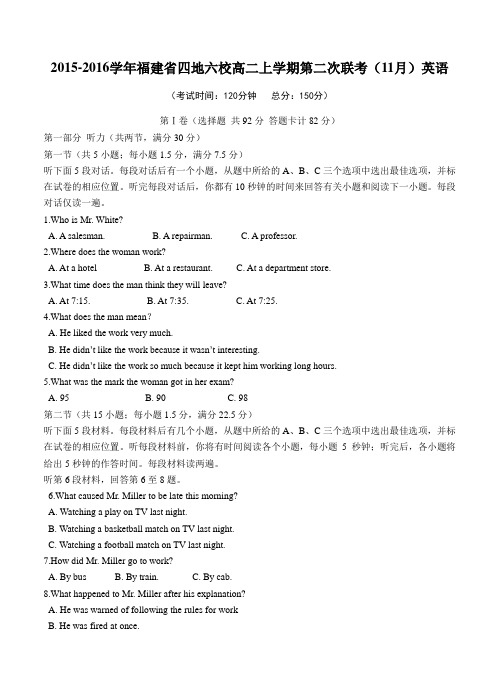
2015-2016学年福建省四地六校高二上学期第二次联考(11月)英语(考试时间:120分钟总分:150分)第Ⅰ卷(选择题共92分答题卡计82分)第一部分听力(共两节,满分30分)第一节(共5小题;每小题1.5分,满分7.5分)听下面5段对话。
每段对话后有一个小题,从题中所给的A、B、C三个选项中选出最佳选项,并标在试卷的相应位置。
听完每段对话后,你都有10秒钟的时间来回答有关小题和阅读下一小题。
每段对话仅读一遍。
1.Who is Mr. White?A. A salesman.B. A repairman.C. A professor.2.Where does the woman work?A. At a hotelB. At a restaurant.C. At a department store.3.What time does the man think they will leave?A. At 7:15.B. At 7:35.C. At 7:25.4.What does the man mean?A. He liked the work very much.B. He didn’t like the work because it wasn’t interesting.C. He didn’t like the work so much because it kept him working long hours.5.What was the mark the woman got in her exam?A. 95B. 90C. 98第二节(共15小题;每小题1.5分,满分22.5分)听下面5段材料。
每段材料后有几个小题,从题中所给的A、B、C三个选项中选出最佳选项,并标在试卷的相应位置。
听每段材料前,你将有时间阅读各个小题,每小题5秒钟;听完后,各小题将给出5秒钟的作答时间。
每段材料读两遍。
高中英语真题-2015—2016学年度第一学期第二次月考试卷
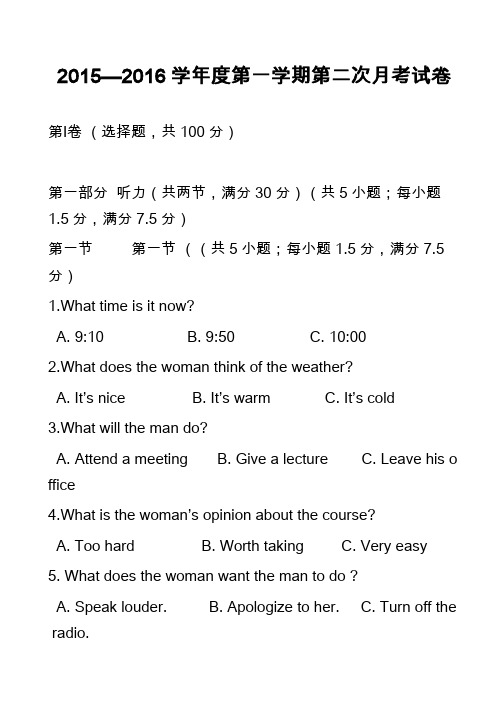
2015—2016学年度第一学期第二次月考试卷第Ⅰ卷(选择题,共100分)第一部分听力(共两节,满分30分)(共5小题;每小题1.5分,满分7.5分)第一节第一节((共5小题;每小题1.5分,满分7.5分)1.What time is it now?A. 9:10B. 9:50C. 10:002.What does the woman think of the weather?A. It’s niceB. It’s warmC. It’s cold3.What will the man do?A. Attend a meetingB. Give a lectureC. Leave his o ffice4.What is the woman’s opinion about the course?A. Too hardB. Worth takingC. Very easy5. What does the woman want the man to do ?A. Speak louder.B. Apologize to her.C. Turn off the radio.第二节(共15小题,每小题:1.5分,满分22.5分)听第6段材料,回答第6至7小题。
6. How long did Michael stay in China?A. Five days.B. One week.C.Two weeks.7. Where did Michael go last year?A. Russia.B. Norway.C. India.听第7段材料,回答第8至9题。
8.Whet food does Sally like?A.Cook dinner.B.Fish.C.Eggs.9.What are the speakers going to do?A.Cook dinner.B.Go shopping.C.Order dishes.听第8段材料,回答第10至13题。
2016届高三年级第二次四校联考英语试题带参考答案及评分标准

2016届高三年级第二次四校联考英语试题2015.12 命题:康杰中学长治二中忻州一中临汾一中【本试题分第I卷和第II卷两部分,时间120分钟,总分150分,听力不计入总分。
】第I卷第一部分听力(共两节,满分30分)做题时,先将答案标在试卷上。
录音内容结束后,你将有两分钟的时间将试卷上的答案转涂到答题卡上。
第一节(共5小题; 每小题1.5分,满分7.5分)听下面五段对话。
每段对话后有一个小题。
从题中所给的A、B、C三个选项中选出最佳选项,并标在试卷的相应位置。
听完每段对话后,你都有10秒钟的时间来回答有关小题和阅读下一小题。
每段对话仅读一遍。
1. What does the man think of his math class?A. Interesting.B. Boring.C. Difficult.2. What does the woman want to do first?A. Do her homework.B. Go to the cinema.C. Go to the concert.3. What are the two speakers talking about?A. The repair of the road.B. A traffic sign.C. Careful drivers.4. How much did the woman pay altogether?A. $ 50.B. $ 48.C. $ 52.5. What does the man mean?A. He will remain in the company.B. He will ask for more money.C. He will accept the woman’s advice.第二节(共15小题;每小题1.5分,满分22.5分)听下面5段对话或独白。
每段对话或独白后有几个小题,从题中所给的A、B、C三个选项中选出最佳选项,并标在试卷的相应位置。
高中英语真题-2015-2016学年高一第二次月考英语试卷

2015-2016学年高一第二次月考英语试卷说明:本试卷分第I卷(选择题)和第II卷(非选择题)两部分。
满分150分,时间120钟。
第一部分:听力(共两节,满分30分)第一节(共5小题:每小题1.5分,满分7.5分)听下面5段对话。
每段对话后有一. 个小题.,从题中所给的A. B.C三个选项中选出最佳选项,并标在试卷的相应位置。
听完每段对话后,你都有10秒钟的时间来回答有关小题和阅读下一小题。
每段对话仅读一遍。
What does the man suggest?A. Taking a break.B. Putting off the talk.C. Going to a pa rkWhat is the woman?A. A secretaryB. A managerC. A saleswoman What does the man think of the blouse?A. Ask for helpB. Make a complaintC. Check the mac hineWhat is the time now?A. 7:30pmB. 7:00pmC. 6:30pmWhat are the two speakers mainly talking about?A. The new school.B. Making pudding.C. The new sch ool restaurant.第二节(共15小题;每小题1.5分,满分22.5分)听下面5段对话。
每段对话后有几个小题,从题中所给的A、B、C三个选项中选出最佳选项,并标在试卷的相应位置。
听每段对话前,你将有时间阅读各个小题,每小题5秒钟:听完后,各小题给出5秒钟的做答时间。
每段对话读两遍。
听下面一段对话,回答第6和第7两个小题。
What is the man having trouble with?A. MemoryB. DrivingC. MoneyWhy does the man talk to the woman?A. To borrow some moneyB. To take a lift.C. To ask for advice听下面一段对话,回答第8和第9两个小题。
2015-2016高三第一学期第二次月考英语试卷(含答案)

2015-2016高三级期中考试英语试卷第I卷第一部分阅读理解(共两节,满分30分)第一节阅读下列短文,从每题所给的四个选项(A、B、C、和D)中,选出最佳选项。
(共10小题;每小题2分,满分20分)AParents, our first teachers, play a highly significant role in our lives.However, doesn’t it seem that many of us become to have conflicts with them when we start high school? We're less likely to listen to them and take their suggestions——we even rebel against them.Why? It may be the so-called “generation gap”. A generation gap appears when we begin to feel our parents are ignoring us, don’t understand us, and we feel we can no longer share our feelings with them.The key reason is our desire for independence. In senior high school, we start to want to take responsibility for our own lives and make our own decisions. But parents resist this. They still want to control us and try to force us to do things they think we should do. Debate and discussion often come to nothing. Gradually, we talk with them less, and keep our feelings locked up inside.Zhang Xiaoyun, 16, of Ningbo, Zhejiang, has talked less and less with her mother since she started senior high school. “She believes studies should be my priority, not my inner world,” Zhang said. “Each day, she asks me the same old questions like, ‘How was your last exam?’ or ‘Have you made any progress in physics?’” To Zhang, these questions are annoying and so she always tries to ignore them and answers perfunctorily. “Sometimes, when I get upset, I quarrel with her. After, she comes to apologize and comfort me. But I know, she doesn’t completely understand me,” Zhang said. Now, a home that was once full of laughter has fallen into gloom and silence.The generation gap can be harmful. Because of the lack of communication, our parentsno longer know what we are thinking about. There are quarrels, even over trivial things.When that happens, we may not be able to concentrate on our studies. Some of us even become afraid to go home after school——a very serious situation for the whole family.1. Which of the following is not included in the passage?A. The causes of generation gap.B. The effects of generation gap.C. One example of generation gap.D. Ways of narrowing generation gap.2. Which of the following is one reason for the generation gap according to the passage?A. Modern society changing very fast.B. Parents having unrealistic hopes of their children.C. Parents and kids not understanding and respecting each other.D. Young people liking to escape from the control of their parents.3. Which of the following words has the closest meaning to the underlined word“perfunctorily”?A. attentivelyB. indifferently(冷淡地)C. flatteringly(奉承地)D. seriously4. In the view of the author, ________.A. parents should allow their children more freedomB. parents and children should not stay togetherC. the younger generation should value the older generationD. academic records are more important than one’s inner worldBDo you still get free plastic bags from the supermarkets? Things have changed.China has banned free plastic bags at shops and supermarkets, and people have to pay for using bags. The rule started on June. It came because our country tried to make litter less. Making super-thin plastic bags has also been banned.The Chinese once used about 3,000,000,000 plastic shopping bags a day, and they have1caused pollution of the environment. The bags have become a main cause of plastic pollution because they are easy to break and people throw them away here and there. So the Chinese people are encouraged to bring their own bags for shopping.What kind of shopping bag is the best to bring? Some students in Anhui have a good idea. They make their own shopping bags. They use old clothes to make cloth bags, and send them to their parents as presents. They also ask their parents and friends to use cloth bags instead of plastic ones. They think it is their duty to protect the environment.5. People in China have to now.A. throw plastic bags here and thereB. collect plastic bags in the streetC. pay for using plastic bags at shops and supermarketsD. use free plastic bags at shops and supermarkets6. The Chinese people are encouraged to bring for shopping.A. no bagsB. free plastic bagsC. their own bagsD. super-thin plastic bags7. What’s the main idea of this article?A. Making super-thin plastic bags has been banned in China.B. The bags have become a main cause of plastic pollution.C. Some students in Anhui begin to make their own shopping bags.D.To protect the environment, free plastic bags have been banned in China.CIn general, people talk about two groups of colors: warm colors and cool colors. Researchers in psychology think that there are also two groups of people: people who prefer warm colors and people who prefer cool colors.The warm colors are red, orange and yellow. Where there are warm colors and a lot of light, people usually want to be active. People think that red, for example, is exciting. Sociable people, those who like to be with others, like red. The cool colors are green, blue and violet. These colors, unlike warm colors, are relaxing. Where there are cool colors, people are usually quiet. People who like to spend time alone often prefer blue.Red may be exciting, but one researcher says that time seems to pass more slowly in a room with warm colors than in a room with cool colors. He suggests that a warm color,such as red or orange in a good color for a living room or restaurant. People who are relaxing or eating do not want time to pass quickly. Cool colors are better for officers or factories if the people who are working there want time to pass quickly.Researchers do not know why people think some colors are warm and other colors are cool. However, almost everyone agrees that red, orange and yellow are warm and that green, blue and violet are cool. Perhaps warm colors remind people of warm days and the cool colors remind them of cool days. Because in the north the sun is higher during summer, the hot summer sunlight appears yellow.8. Which of the following statements is not true?A. Sociable people like warm colors.B. Warm colors can make people excited.C. People who like to be with others don’t like red.D. Where there are warm colors, people want to be active.9. Which is the right color for different rooms?A. Red or orange for officers.B. Orange for dining rooms.C. Blue for bedrooms.D. Red for studies.10. What is the main idea of the last paragraph?A. It seems the reason why people think some colors are warm and others are cool.B. Warm colors remind people of warm days.C. Cool colors remind people of cool days.D. People have an agreeable opinion of warm colors and cool colors.第二节(共5小题,每小题2分,满分10分)根据短文内容,从短文后的选项中选出能填入空白处的最佳选项,选项中有两项为多余选项。
2015-2016学年上期高一四地六校联考第二次月考英语试卷

“华安、连城、永安、漳平一中、龙海二中、泉港一中”六校联考2015~2016学年上学期第二次月考高一英语试题(考试时间:120分钟总分:150分)命题人:华安一中审题人: 华安一中本试卷分第Ⅰ卷和第Ⅱ卷两部分,共10页。
第Ⅰ卷第一部分听力(共两节,满分30分)做题时,先将答案标在试卷上,录音内容结束后,你将有两分钟的时间将试卷上的答案转涂到答题卡上。
第一节(共5小题;每小题1.5分,满分7.5分)听下面5段对话。
每段对话后有一个小题,从题中所给的A、B、c三个选项中选出最佳选项,并标在试卷的相应位置。
听完每段对话后,你都有10秒钟的时间来回答有关小题和阅读下一小题。
每段对话仅读一遍。
1. What will the woman do tonight?A. Work.B. Stay home.C. Go to a pub.2. What does the man think the weather will be like?A. Cloudy.B. Sunny. C.Rainy3. How many people are there in the man's basketball team?A. 9.B.10.C.15.4. Where is the man's sister going next summer?A. To AfricaB. To South America.C. To Australia.5. Where are the speakers?A. In a zoo.B. At their house.C. In an office第二节(共15小题;每小题1.5分,满分22.5分)听下面5段对活或独白。
每段对话或独白后有几个小题,从题中所给的A、B、C三个选项中选出最佳选项,并标在试卷的相应位置。
听每段对话或独白前,你将有时间阅读各个小题,每小题5秒钟;听完后,各小题将给出5秒钟的作笞时间。
福建省四地六校高一上学期第二次月考英语试题含答案
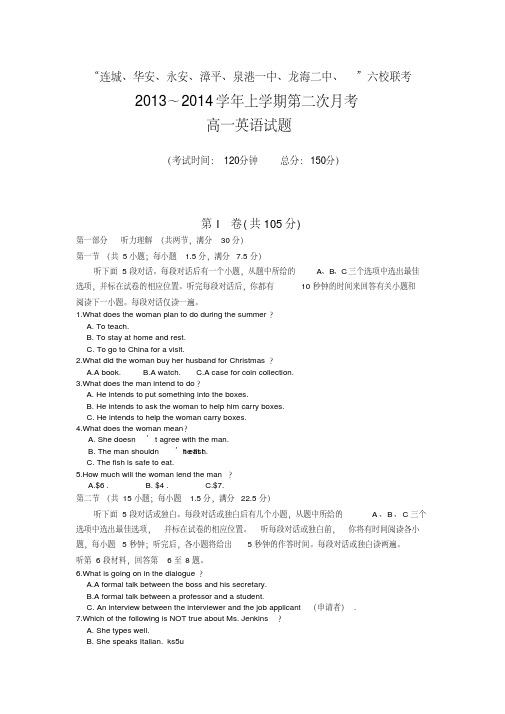
33. The kind-hearted couple treat the orphan very well as if he_______ their own son.
A. were
B. is
C. had been
D. should be
34. The old farmer has two daughters, _______is kind to him, _______makes him very sad.
A. Going shopping. B. Washing clothes.
13.Where did George see Mary ?
A. At the office.
B. At the concert.
C. Looking after the baby.
C. In his sister
’ s home.
“连城、华安、永安、漳平、泉港一中、龙海二中、 ”六校联考
2013~2014 学年上学期第二次月考 高一英语试题
(考试时间: 120分钟 总分: 150分)
第 I 卷( 共 105 分)
第一部分 听力理解 (共两节,满分 30 分)
第一节 (共 5 小题;每小题 1.5 分,满分 7.5 分)
听下面 5 段对话。每段对话后有一个小题,从题中所给的
C. To go to China for a visit.
2.What did the woman buy her husband for Christmas ?
A.A book.
B.A watch. C.A case for coin collection.
3.What does the man intend to do ?
福建省四地六校高三英语上学期第二次联考(11月)试题

“华安,连城,永安,漳平,泉港一中,龙海二中”六校联考2015-2016上学期第二次月考高三英语试题(时间:120分钟总分:150分)第I卷第一部分听力 (共两节, 满分30分)做题时,先将答案标在试卷上。
录音内容结束后,你将有两分钟的时问将试卷上的答案转涂到答题卡上。
第一节(共5小题;每小题1.5分,满分7.5分)听下面5段对话。
每段对话后有一个小题,从题中所给的A、B、C三个选项中选出最佳选项,并标在试卷的相应位置。
听完每段对话后,你都有10秒钟的时间来回答有关小题和阅读下一小题。
每段对话仅读一遍。
1. Which word can be used to describe Bill?A. Friendly.B. Brave.C. Hopeful.2. What does the woman ask the man to do?A. Close the windows.B. Call a taxi.C. Lock the suitcase.3. What does the woman mean?A. She didn’t wa tch the comedy.B. She didn’t like the comedy.C. She thought the comedy was funny.4. When did the man enter the People’s University?A. Three years ago.B. Last year.C. This year.5. Where does this conversation take place most probably?A. At an airport.B. On the beach.C. At a travel agency.第二节 (共15小题;每小题1.5分,满分22.5分)听第6段材料,回答第6、7题。
6. What sport does the woman like best?A. Volleyball.B. Football.C. Baseball.7. What will the man buy for the woman as a gift?A. A computer.B. A typewriter.C. A camera.听第7段材料,回答第8、9题。
福建省“四地六校”学年高一英语下学期第二次联考试题
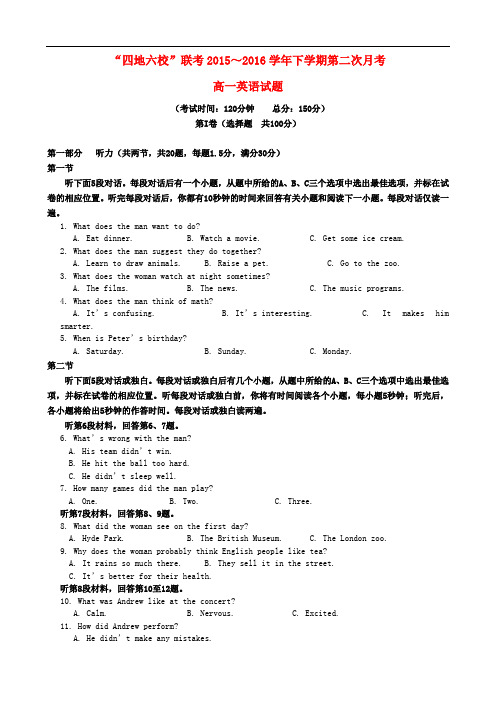
“四地六校”联考2015~2016学年下学期第二次月考高一英语试题(考试时间:120分钟总分:150分)第I卷(选择题共100分)第一部分听力(共两节,共20题,每题1.5分,满分30分)第一节听下面5段对话。
每段对话后有一个小题,从题中所给的A、B、C三个选项中选出最佳选项,并标在试卷的相应位置。
听完每段对话后,你都有10秒钟的时间来回答有关小题和阅读下一小题。
每段对话仅读一遍。
1. What does the man want to do?A. Eat dinner.B. Watch a movie.C. Get some ice cream.2. What does the man suggest they do together?A. Learn to draw animals.B. Raise a pet.C. Go to the zoo.3. What does the woman watch at night sometimes?A. The films.B. The news.C. The music programs.4. What does the man think of math?A. It’s confusing.B. It’s interesting.C. It makes himsmarter.5. When is Peter’s birthday?A. Saturday.B. Sunday.C. Monday.第二节听下面5段对话或独白。
每段对话或独白后有几个小题,从题中所给的A、B、C三个选项中选出最佳选项,并标在试卷的相应位置。
听每段对话或独白前,你将有时间阅读各个小题,每小题5秒钟;听完后,各小题将给出5秒钟的作答时间。
每段对话或独白读两遍。
听第6段材料,回答第6、7题。
6. What’s wrong with the man?A. His team didn’t win.B. He hit the ball too hard.C. He didn’t sleep well.7. How many games did the man play?A. One.B. Two.C. Three.听第7段材料,回答第8、9题。
高三英语月考试题及答案-四地六校2015-2016学年上学期第二次联考(11月)试卷
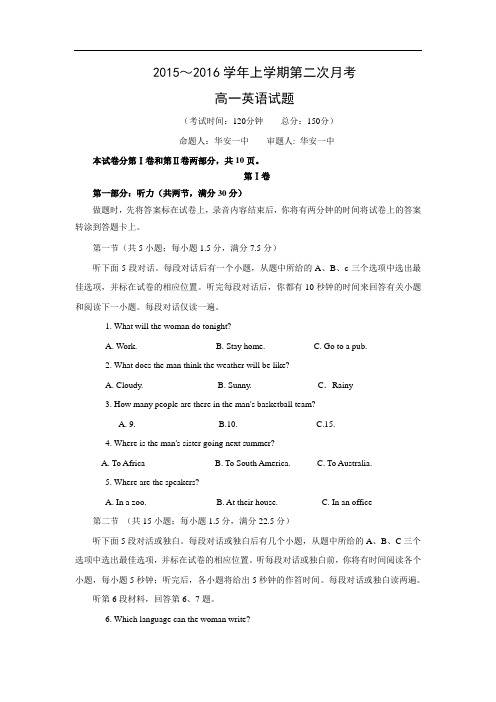
2015~2016学年上学期第二次月考高一英语试题(考试时间:120分钟总分:150分)命题人:华安一中审题人: 华安一中本试卷分第Ⅰ卷和第Ⅱ卷两部分,共10页。
第Ⅰ卷第一部分:听力(共两节,满分30分)做题时,先将答案标在试卷上,录音内容结束后,你将有两分钟的时间将试卷上的答案转涂到答题卡上。
第一节(共5小题;每小题1.5分,满分7.5分)听下面5段对话。
每段对话后有一个小题,从题中所给的A、B、c三个选项中选出最佳选项,并标在试卷的相应位置。
听完每段对话后,你都有10秒钟的时间来回答有关小题和阅读下一小题。
每段对话仅读一遍。
1. What will the woman do tonight?A. Work.B. Stay home.C. Go to a pub.2. What does the man think the weather will be like?A. Cloudy.B. Sunny. C.Rainy3. How many people are there in the man's basketball team?A. 9.B.10.C.15.4. Where is the man's sister going next summer?A. To AfricaB. To South America.C. To Australia.5. Where are the speakers?A. In a zoo.B. At their house.C. In an office第二节(共15小题;每小题1.5分,满分22.5分)听下面5段对活或独白。
每段对话或独白后有几个小题,从题中所给的A、B、C三个选项中选出最佳选项,并标在试卷的相应位置。
听每段对话或独白前,你将有时间阅读各个小题,每小题5秒钟;听完后,各小题将给出5秒钟的作笞时间。
每段对话或独白读两遍。
听第6段材料,回答第6、7题。
高三英语月考试题及答案-四地六校2015-2016学年高三上学期第二次联考(11月)
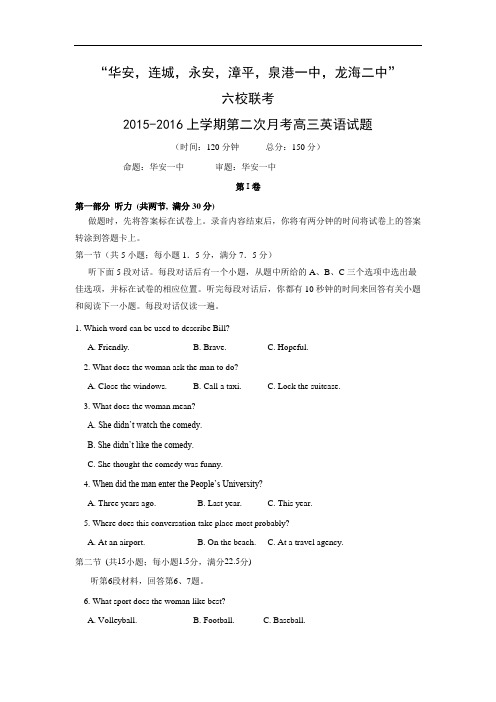
“华安,连城,永安,漳平,泉港一中,龙海二中”六校联考2015-2016上学期第二次月考高三英语试题(时间:120分钟总分:150分)命题:华安一中审题:华安一中第I卷第一部分听力(共两节, 满分30分)做题时,先将答案标在试卷上。
录音内容结束后,你将有两分钟的时问将试卷上的答案转涂到答题卡上。
第一节(共5小题;每小题1.5分,满分7.5分)听下面5段对话。
每段对话后有一个小题,从题中所给的A、B、C三个选项中选出最佳选项,并标在试卷的相应位置。
听完每段对话后,你都有10秒钟的时间来回答有关小题和阅读下一小题。
每段对话仅读一遍。
1. Which word can be used to describe Bill?A. Friendly.B. Brave.C. Hopeful.2. What does the woman ask the man to do?A. Close the windows.B. Call a taxi.C. Lock the suitcase.3. What does the woman mean?A. She didn’t watch the comedy.B. She didn’t like the comedy.C. She thought the comedy was funny.4. When did the man enter the People’s University?A. Three years ago.B. Last year.C. This year.5. Where does this conversation take place most probably?A. At an airport.B. On the beach.C. At a travel agency.第二节(共15小题;每小题1.5分,满分22.5分)听第6段材料,回答第6、7题。
- 1、下载文档前请自行甄别文档内容的完整性,平台不提供额外的编辑、内容补充、找答案等附加服务。
- 2、"仅部分预览"的文档,不可在线预览部分如存在完整性等问题,可反馈申请退款(可完整预览的文档不适用该条件!)。
- 3、如文档侵犯您的权益,请联系客服反馈,我们会尽快为您处理(人工客服工作时间:9:00-18:30)。
“华安、连城、永安、漳平一中、龙海二中、泉港一中”六校联考2015~2016学年上学期第二次月考高一英语试题(考试时间:120分钟总分:150分)本试卷分第Ⅰ卷和第Ⅱ卷两部分,共10页。
第Ⅰ卷第一部分听力(共两节,满分30分)做题时,先将答案标在试卷上,录音内容结束后,你将有两分钟的时间将试卷上的答案转涂到答题卡上。
第一节(共5小题;每小题1.5分,满分7.5分)听下面5段对话。
每段对话后有一个小题,从题中所给的A、B、c三个选项中选出最佳选项,并标在试卷的相应位置。
听完每段对话后,你都有10秒钟的时间来回答有关小题和阅读下一小题。
每段对话仅读一遍。
1. What will the woman do tonight?A. Work.B. Stay home.C. Go to a pub.2. What does the man think the weather will be like?A. Cloudy.B. Sunny. C.Rainy3. How many people are there in the man's basketball team?A. 9.B.10.C.15.4. Where is the man's sister going next summer?A. To AfricaB. To South America.C. To Australia.5. Where are the speakers?A. In a zoo.B. At their house.C. In an office第二节(共15小题;每小题1.5分,满分22.5分)听下面5段对活或独白。
每段对话或独白后有几个小题,从题中所给的A、B、C三个选项中选出最佳选项,并标在试卷的相应位置。
听每段对话或独白前,你将有时间阅读各个小题,每小题5秒钟;听完后,各小题将给出5秒钟的作笞时间。
每段对话或独白读两遍。
听第6段材料,回答第6、7题。
6. Which language can the woman write?A. Japanese.B. FrenchC. Spanish7. What is the man probably?A . A studentB . A teacher. C. A manager.听第7段材料,回答第8、9题。
8. What does the woman say about the boy from Haiti?A. He got a reward at schoolB. He didn't pass his English examC . He has difficulty communicating with other students9. What does the woman think of helping the boy?A. Hard.B. ExcitingC. Time-wasting听第8段材料,回答第10至12题。
10. Why can the woman keep slim?A. She seldom eats chocolate.B . She goes on a diet.C. She does much exercise.11. How often does the basketball club meet ?A. Once a weekB. Once two weeks.C. Once a month.12. What are the speakers going to do next?A. Look for running machines.B. Buy an exercise bike.C. Go to a gym.听第9段材料,回答第13至16是13. Where does Sally want to go ?A. To the zoo.B. To the London Eye.C. To the Covent Gardens.14. What is Billy interested in ?A. BoatsB. Operas.C. Animals.15. What does the man suggest the woman do in London ?A. Go shoppingB. Enjoy an opera.C. Visit her parents.16. What is the relationship between the speakers ?A . Brother and sister B. Husband and wife. C. Father and daughter. 听第10段材料,回答第1 7至20题17. How did Phoebe arrive in LA?A. By busB. By airC. By train.18. What was Phoebe doing when she phoned Susan from the flat?A. Having a meal.B. Preparing a meal.C. Listening to music.19. How did Susan feel when she heard Phoebe's answer ?A. Surprised.B. Angry.C. Happy.20. What do we know about Phoebe ?A. She went into a wrong house.B. She has found Susan's keyC. She broke the window.第二部分阅读理解(共两节,满分40分)第一节(共15小题;每小题2分,满分30分)阅读下列短文,从每题所给的四个选项(A、B、C和D)中,选出最佳选项。
AA man named Smith was sitting on his roof during a flood, and the water was upto his feet. Before long a fellow in a canoe passed and shouted, "Can I give you a lift to higher ground?""No, thanks," said Smith. "I have faith in God and he will save me."Soon the water rose to Smith's waist. At this point a motor boat pulled up and someone called out, "Can I give you a lift to higher ground?""No, thanks, I have faith in God and he will save me."Later a helicopter flew by, and Smith was now standing on the roof with water up to his neck. "Grab the rope, "shouted the pilot(飞行员). "I'll pull you up.""No, thanks," said Smith. "I have faith in God and he will save me. "But after hours of struggling with water, poor exhausted(筋疲力尽) Smith drowned and went to his reward. As he arrived at the Pearly Gates, Smith met God and complained about this. "Tell me, God, "he said, "I had such faith in you to save me and you let me drown. What happened?"To which God replied, "What do you want from me? I sent you two boats and a helicopter."21.When the pilot asked Smith to grab the rope, ______.A. Smith pulled the pilot upB. Smith did soC. Smith didn't hear himD. Smith didn't do so22.What’s the meaning of “went to his reward” __________.A. got injuredB. diedC. got savedD. went to get some gifts23.What do you think of this passage? This passage is very ______.A. movingB. depressingC. humorousD. surprisingBSuppose you are a visitor in the land of Mongolia, some friends ask you to eat with them. What kind of manners do they want you to have? They want you to give a loud burp after you finish eating. Burping would show that you like your food. In some countries, if you g ive a big burp, you are told to say “Excuse me, please”.In many places people like to eat together. But in some parts of Polynesia it is bad manners to be seen eating at all. People show their good manners by turning their backs on others while they eat.What are manners like in an East African town? The people try not to see you.They are being polite. You may see a friend. He may not see you at all. If you are polite, you will sit down beside him. You will wait until he finishes what he is doing.Then he will talk to you. Manners are different all over the world. But it is good to know that all manners begin in the same way. People need ways to show that theywant to be friends.24. In Mongolia, burping is a way of showing that __________.A . you are impoliteB . you enjoyed the meal prepared by the hostC . your meal was not enoughD . you are friendly with your host25. In Polynesia, to be polite while eating you should __________.A . turn your back on othersB . sit stillC . eat quicklyD . say “Excuse me, please”26 . People in an East African town are being polite by __________.A . waiting for a long time before visitsB . sitting down beside othersC . seeing a friend quicklyD . trying not to see you27. The best title for this passage is __________.A . Different Kinds of MannersB . All manners is the Same WayC . Good MannersD . Do Have Manners.CMy boss’s daughter was studying in the Philippines. He asked me if my husband and I could take care of her. He thought his daughter would be able to improve her English communication skills in this way.After days of thinking, we agreed. He then brought her here and left after 3 days.I thought that my boss’s daughter was well-mannered, but that was wrong.After a month of staying in the Philippines, she started to show her true colors.When my husband asked her what she wanted for breakfast, she answered him in a rude way. From then on, we experienced fights at home. T here was a time when we didn’t talk to her for a week as a punishment of not being good to us. What I hated most was that she didn’t care about other people’s feelings. She ate ahead of us when we were still working and didn’t leave anything for us. So we had to separate her food from ours to avoid such a problem.The worst thing about her was that she shouted at us. I was wondering if she did this to her parents. We told this to her parents, but unfortunately I didn’t think that solved the problem. This situation lasted for almost 8 months. Our patience was tested during that time.We tried to teach her everything we could to make her a better person, but I guess8 months may not to be enough. We even tried to understand her and adjust for her,but it didn’t work. I just hope that she learned something from us and from other Filipinos.28. This passage is mainly about the writer’s experience of________ .A. trying to please her bossB. changing a girl’s bad behaviorC. improving her communication skillsD. dealing with a teenage girl staying in her house29. What do the examples in paragraph 3 tell us ?A. The daughter wasn’t behaving well.B. The writer and her husband were careless.C. The writer and her husband hated children.D. The daughter tried her best to make others happy.30. The underlined word “that” in paragraph 4 refers to_______.A. being patient with herB. telling herparents about her behaviorC. asking her parents about herD. her parents punishing her31. After reading the passage, we learn that .A. the daughter learnt to behave well in the endB. the daughter hated dealing with othersC. the writer didn’t enjoy the daughter’s stayD. the writer had known the daughter was hard to deal withDAt the age of 5, most children in the USA start to go to school. Public education is free and most children go to schools near their homes. School in these early years is fun. The children learn to read and write. But they also play games and go on trips.There is no reason at such an early age for him to hit the books.The situation changes as children become older. The subjects become more difficult.Students must learn about world history, algebra (代数), and the life sciences. Tests become more common. Pressure is growing to hit the books, study hard, and advance.However, most serious students only really begin hitting the books for long hours when they reach high school.High school students who hope to continue their education at a college or university must take a special national test called the S-A-T. The test has two parts.The first part tests the student's ability with numbers and mathematical skills. The second part tests the student's ability in the English language.The S-A-T test is very important. A high school student who gets a high score on the two parts of the test has a good chance to enter a top American college. For this reason, many students hit the books for months to prepare for the S-A-T.32.The underlined phrase “hitting the books” in the second paragraph probably means________.A. working hard at a certain subjectB. reading books with great effortC. reading books in a hurryD. studying a subject carefully33. The students in high school ________.A. have to take the S-A-TB. are free and happyC. don’t hit the books until they pass the S-A-TD. have to hit the books if they want to go on to college34. American children don't need________ if they want to study in public schools.A. to hit the booksB. to work hard at their lessonsC. to pay for the educationD. to take many tests35. Which of the following is NOT true according to the passage?A. In America the students have to pass a certain test to continue their education.B. The students must spend much time preparing for the S-A-T.C. Those who fail in the S-A-T cannot go to a top college.D. Young children needn’t work hard at their lessons because education is free. 第二节(共5小题;每小题2分,满分10分)根据短文内容,从短文后的选项中选出能填入空白处的最佳选项。
